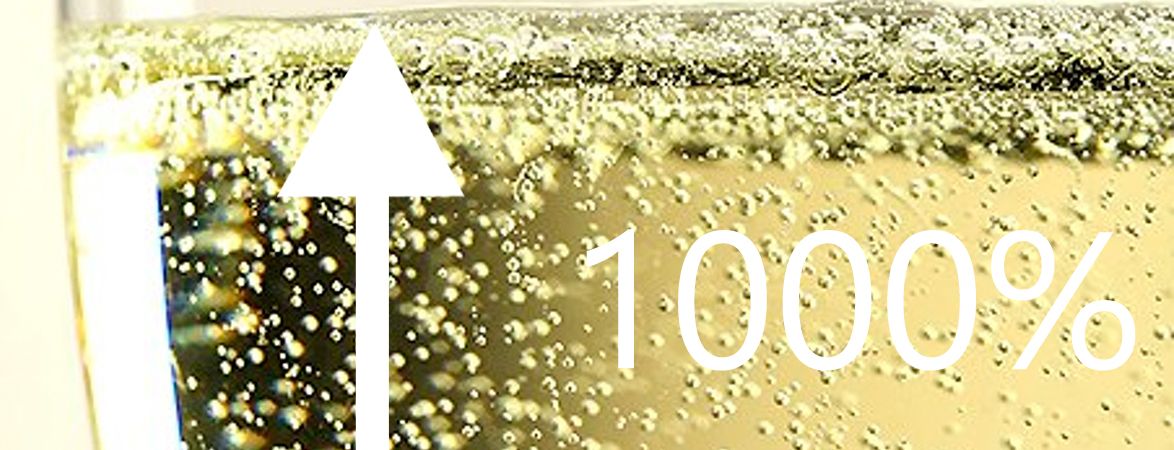“Prosecco magnum sales up to 1000%”, this was the title of an article I recently read in one of those industry newsletters that I am subscribed to and whilst the tone of the article seemed one of excitement, and the producers were described as very happy and could not keep up with the requests, I see this as the biggest threat for the Prosecco to date. I had already
written about the risks for the Prosecco brand if the Consortium and the producers did not stop worrying about numbers and start working to protect the brand, but as usual in Italy, controllers and controlled are the same people and the consortium is made by wineries and bottlers with completely different goals and objectives, quantity vs quality, therefore, Italian Consortiums tend to be like ships at the mercy of the waves, useless ships expensive to maintain.
The problem with Prosecco is not that they are flooding the market, is that they are flooding the market with very poor quality sparkling wine and if they continue, this strategy will eventually backfire. We are all aware of similar cases, the oaked chardonnay is the last I can remember, but if we go back, in the eighties, we all remember the Frascati and Lambrusco, supermarkets shelves were full, big bottles, at the time Magnum did not sound and look like it does now, it was a bit too posh for them, but everyone loved them, Frascati and Lambrusco were everywhere, and now they’ve gone for good. Both appellations are trying very hard to come back into fashion, spending serious amount of money, but going nowhere.
Wine on a magnum is not something new, it has always been around, from Champagne to Cava to still wines, but these are special occasion bottles and this is reflected on their price. Prosecco magnums are being sold, mainly if not only, in supermarkets, at a slightly higher price than the single bottle, there is nothing special about them except the price, anyone looking to buy a bottle of Prosecco will choose the magnum over the single bottle, the price difference is so little then even if the leftover is used for cooking is still a bargain. Prosecco magnums are not only bad for the Prosecco brand, but are inviting people to drink more, what is the point of supporting the “drink responsibly” campaign, if the result is to get people drinking more; it is like giving a bar of chocolate to a child and ask him not to eat it.
Good Prosecco producers should not be happy, neither the Consortium, this strategy not only is damaging the Prosecco brand but is also putting under enormous pressure wine growers to compete in such a price driven market, currently the average wine drinker does not want to pay for Prosecco, Prosecco has already become a cheap alternative to Champagne, the brand has already been damaged and from here to the end of Prosecco the road is downhill, even Champagne’s producers at their peak or now that are trying to get back the market share lost, haven’t gone that far. Anyone with some sort of marketing background or even common sense, and I would go back to the consortium that should be aware of what’s happening and protect the Prosecco brand, should intervene. What is the point of stopping Prosecco from being sold on tap when they are allowing a very few bottlers, these people are not wine growers, to flood, they are literally flooding the market with Prosecco Magnum which, in this case, is cheap Prosecco in a big bottle.
Prosecco rose to fame during the recession, when people could not afford Champagne anymore and discovered this lighter, easier to drink, sparkling wine and little by little, in a very few years became a phenomenon, with growing rates unseen before, overtaking Champagne and any other sparkling wine, due to their growing area and production which is bigger than any other sparkling wine, but instead of building a brand and looking after it, Prosecco producers and Consortium have kept producing more and more not only to fulfil demand, but to create more, and their actions have brought the prices to an unsustainable level for wine growers, wholesale prices for Prosecco grapes are higher than the actual cost of the bottle and now that the economic situation has improved worldwide and sparkling wine is being made everywhere, the only thing missing is an area or group of producers to join forces to erode market share from Prosecco, and I don’t think it will take long.
 FREE DELIVERY FOR ORDERS OVER £100
FREE DELIVERY FOR ORDERS OVER £100


